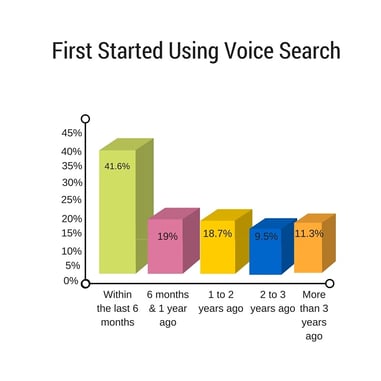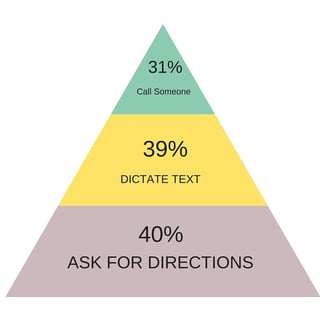How Voice Search Will Shape the Future of Digital Marketing


“Ok Google… show me how voice search will shape the future of digital marketing.”
 If only we could see how this relatively new technology will shape the way we think about and implement our digital marketing strategies. But one thing we do know is that voice search is growing, and it’s growing fast. Google has estimated that 20% of mobile search queries are voice searches.
If only we could see how this relatively new technology will shape the way we think about and implement our digital marketing strategies. But one thing we do know is that voice search is growing, and it’s growing fast. Google has estimated that 20% of mobile search queries are voice searches.
You may be thinking that voice search won’t impact search results because you are still using the same focused keywords in your query. But that assumption would be wrong. Voice search impacts the results you will be shown in a very noticeable and real way.
Even developers are starting to code with a more conversational style in mind. Algorithms will shift to accommodate this new search style, leaving the marketers slow to adapt in the dust. Which brings us to the major question:
What exactly does voice search mean for SEO and digital marketing?
A lot, actually. The technology is advancing at a fast pace. Google’s speech recognition error rate is at 8%. That is down from 25% just two years ago. This is allowing people to feel more confident about using natural speech when using their devices and getting more accurate results when they do so. The younger generation already finds it easy and comfortable to interact with their devices the same way they would speak with another human being.
So, let’s think about the way you search. When typing, for example, you would type in a search query using fewer words such as, “vacation rentals Napa Valley”. Whereas if you were speaking, you would search in a more conversational way such as, “Where are some vacation rentals in Napa Valley?” That is another thing to keep in mind about voice search, people will be searching more in question form instead of two or three word phrases. Words like who, what, when, where and why will become important in your keyword strategies.
With the rise of virtual assistants, (think Siri, Cortana and Google Voice) people are learning to be more conversational with their devices. This is a fairly new phenomenon. Take a look at the graph below. When asked when they started using voice search for the first time, 41.6% of participants said it was only within the last six months. Needless to say, voice search is soon to become the new norm. As digital marketers, we need to know what this means for us and our audiences.

Source: http://searchengineland.com/google-reveals-20-percent-queries-voice-queries-249917
It is also important to keep in mind the way voice search is being utilized currently. Right now, most people are using voice search for asking for directions, calling someone and dictating texts.
 But as more “virtual assistants” come to market, voice search will most likely be used for searches ranging from directions, to where to go to dinner, to where to buy a phone charger. Let’s take a look at how voice search will affect the different areas of digital marketing.
But as more “virtual assistants” come to market, voice search will most likely be used for searches ranging from directions, to where to go to dinner, to where to buy a phone charger. Let’s take a look at how voice search will affect the different areas of digital marketing.
Ads & Paid Search
Voice search already has results in the SERPS. And even now, sometimes an ad will be served. Which begs the question, are you optimizing your ads to come up for voice search? If not, taking action here and starting to test now will provide some real insight that your peers may not have yet. Add relevant, long tail and voice friendly keyword phrases to your list and see what happens. Below are a couple of things this voice searches can tell us that text cannot.
-
Intent
Using conversational language shows stronger intent. Again, we come back to the who, what, when, where, and why keywords and how they all can all show intent and the readiness of a user to take action.
 This information is highly valuable. Identify your highest value phrases and questions and use this is your keyword strategies. If you are bidding on ads, optimize and bid up on these questions and long tail keywords.
This information is highly valuable. Identify your highest value phrases and questions and use this is your keyword strategies. If you are bidding on ads, optimize and bid up on these questions and long tail keywords.
-
Local Impact
Voice search on mobile devices is three times more likely to produce local results than on a desktop. This makes it more important than ever to pay attention to local search if you have a physical location. Keep your local listings up to date. Is your address and contact information accurate? What is your neighborhood called to the locals? Targeting and focusing on things like that can get you found over your competition. This allows users to get faster answers and take swifter action. Users no longer have to go to your site to take action or find what they are looking for.

Content and Inbound Marketing
Now more than ever is the time to truly listen to the questions being asked by consumers and make sure we are answering them as if they were right in front of us. Using sites such as Answer the Public can help you find some of the top questions being posed in your industry. Other ways to find hard hitting questions being asked is in article comment sections, on social media and if you don’t already have a Q&A section on your website, now is the time to implement one. Thinking more like a journalist than a marketer is going to do wonders for you in this new age of voice search. Drop the sales pitch and provide some real, quality content.
Recap, take always, and action items:
- Voice search means longer tail keywords and more natural, conversational phrasing.
- Intent will be clearer with voice search.
- Voice search will have a big impact on local search results.
- Start writing more like a journalist, and less like a marketer.
- Test out voice search yourself and see what kind of results you are getting, and most importantly, what you can do to make those results better.
- This will pose a big shift in the way we, as marketers, do things. But isn’t it exciting to be apart of a paradigm shift in the industry?
- Predictions for the future of voice search include: targeting accents, tone of voice and context. Maybe even a separate branch of SEO will be born for voice search specifically.
Start thinking about this now and see how it pays off for you. The early bird gets the worm. Go get ‘em.

May 24, 2016
